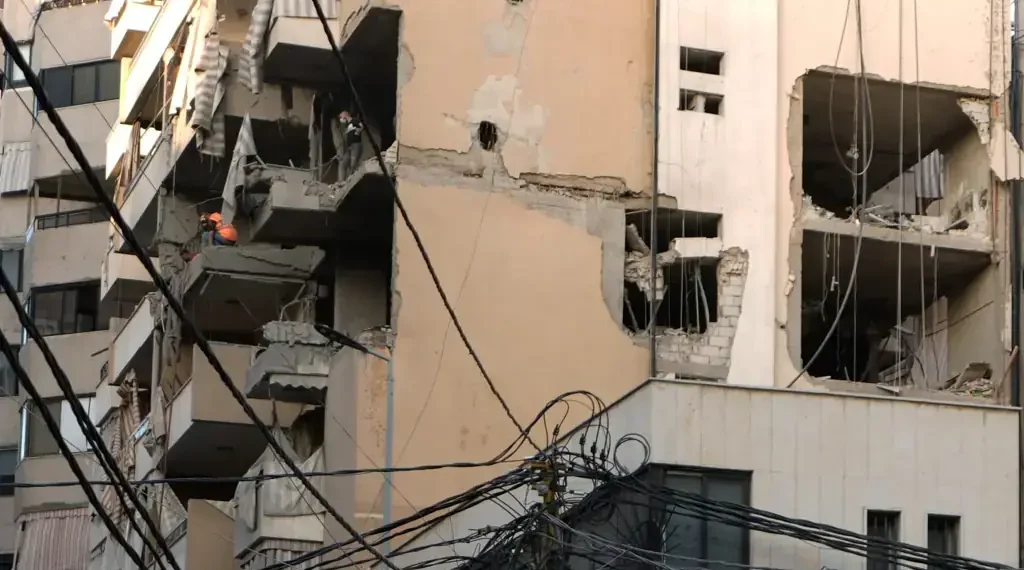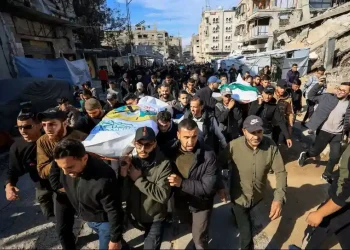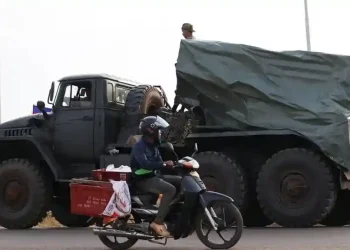Israel Targets Hezbollah Official in Rare Beirut Strike Amid Rising Cross-Border Tensions
Israel carried out an airstrike on a residential district in Beirut on Sunday, its first attack on the Lebanese capital since June, intensifying already fraught relations along the border nearly a year after a fragile ceasefire took effect. Lebanese authorities said the strike, which Israel said targeted Hezbollah’s chief of staff, killed one person and wounded 21, prompting renewed warnings of a broader regional escalation.
Lebanon’s government condemned the attack and urged international intervention, as the strike came days before Pope Leo XIV is scheduled to visit the country. The incident marks another escalation in a series of recent cross-border confrontations involving Israel, Hezbollah and other armed groups operating in southern Lebanon.
The Strike in Beirut’s Southern Suburbs
Smoke rose over Beirut’s southern district of Haret Hreik after the strike hit an upper floor of an apartment building in a densely populated neighborhood. Videos shared on social media showed crowds gathering near the blast site before security forces fired shots in the air to clear the area for emergency workers. The Lebanese military later cordoned off the street as firefighters and medics responded.
Lebanon’s Health Ministry confirmed the casualty figures, while local media reported that at least one drone was seen circling the area before and after the impact. The National News Agency, Lebanon’s state-run outlet, said security forces were working to stabilize the site and prevent further injuries.
Israeli officials said the strike targeted a senior operational figure within Hezbollah, but did not provide additional details. In a statement, Israeli Defense Minister Israel Katz said the military “will continue to act forcefully to prevent any threat to the residents of the north and the state of Israel.” A government spokesperson declined to say whether advance notice was given to the United States, adding only that Israel “makes decisions independently.”
Lebanon’s Response and Ceasefire Tensions
Lebanon’s President Joseph Aoun strongly criticized the strike, accusing Israel of failing to uphold commitments under last year’s ceasefire agreement. The agreement, brokered with international support after months of clashes along the border, sought to reduce risks of a larger conflict involving Hezbollah, Israel and other armed factions.
Aoun called on the international community to “intervene with strength and seriousness to stop the attacks on Lebanon and its people,” urging diplomatic pressure to prevent further violations. Prime Minister Nawaf Salam echoed the call and reiterated the government’s pledge to disarm all non-state armed groups, including Hezbollah—an objective Lebanese authorities say is supported by an approved national defense strategy.
UN peacekeepers stationed in southern Lebanon have repeatedly warned that recent Israeli airstrikes violate the ceasefire. The UN Interim Force in Lebanon (UNIFIL) has also raised concerns about retaliatory rocket fire and the presence of armed fighters near civilian areas, urging all sides to avoid actions that could spark wider conflict.
Growing Pressure on Hezbollah and Lebanon
Israel has stepped up its pressure on Hezbollah in recent weeks, arguing that the Iran-backed group has been rebuilding defensive positions and weapons stockpiles in areas south of the Litani River. Israeli intelligence officials told regional media that monitoring flights and reconnaissance missions have increased since early autumn, though independent verification remains limited.
Lebanon’s government disputes Israel’s claims and says its own military has increased patrols in the south to ensure compliance with UN Security Council resolutions. Lebanese officials argue that allegations of Hezbollah rearmament are used by Israel to justify continued airstrikes, which they say undermine prospects for negotiated de-escalation.
President Aoun proposed last week that Lebanon was prepared to restart direct talks with Israel to halt airstrikes and resolve disputes over five hilltop positions still occupied by Israel along the border. It remains unclear whether Israel will participate in such negotiations.
Civilian Impact and Local Testimony
Residents of Haret Hreik described the blast as sudden and powerful, sending dust and debris across a busy commercial district. “This is definitely a civilian area and void of any military presence,” Hezbollah parliamentarian Ali Ammar told reporters at the scene, though he offered no details on who may have been targeted or whether Hezbollah members were present in the building.
Humanitarian organizations operating in Lebanon warned that renewed instability threatens communities already strained by economic challenges, displacement and infrastructure shortages. The International Committee of the Red Cross said its teams were placed on alert following the attack, noting that disruptions to essential services—including electricity and clinical care—were still being assessed.
Escalation in Southern Lebanon
Sunday’s airstrike follows an Israeli attack earlier in the week that killed thirteen people in the Ein el-Hilweh Palestinian refugee camp near Sidon. Israeli officials said the strike targeted a Hamas military facility, but Hamas denied operating armed infrastructure inside the crowded camp, one of the largest in Lebanon.
The earlier incident was the deadliest recorded since the ceasefire took effect. Analysts say both events reflect intensifying pressure along Lebanon’s southern border, where multiple factions—including Hezbollah, Hamas and smaller armed groups—operate in a politically complex environment.
International observers warn that continuing strikes, combined with political uncertainty and external involvement from regional actors, raise the risk of a sudden escalation. The International Crisis Group said in a recent assessment that “miscalculation or unilateral action by any party could shift the situation from sporadic violence to a new conflict cycle.”
As diplomatic efforts continue, Lebanese officials are urging international partners to prevent further escalation before the arrival of Pope Leo XIV, whose visit is seen as a symbolic gesture of stability and solidarity during a period of deep national strain.
This article was rewritten by JournosNews.com based on verified reporting from trusted sources. The content has been independently reviewed, fact-checked, and edited for accuracy, neutrality, tone, and global readability in accordance with Google News and AdSense standards.
All opinions, quotes, or statements from contributors, experts, or sourced organizations do not necessarily reflect the views of JournosNews.com. JournosNews.com maintains full editorial independence from any external funders, sponsors, or organizations.
Stay informed with JournosNews.com — your trusted source for verified global reporting and in-depth analysis. Follow us on Google News, BlueSky, and X for real-time updates.














